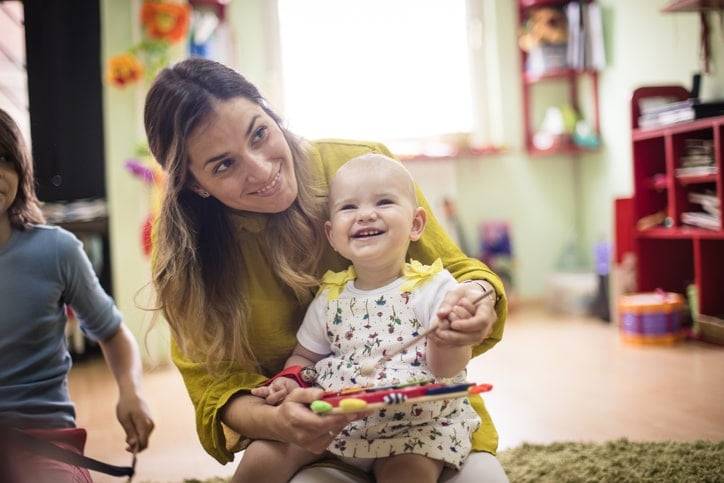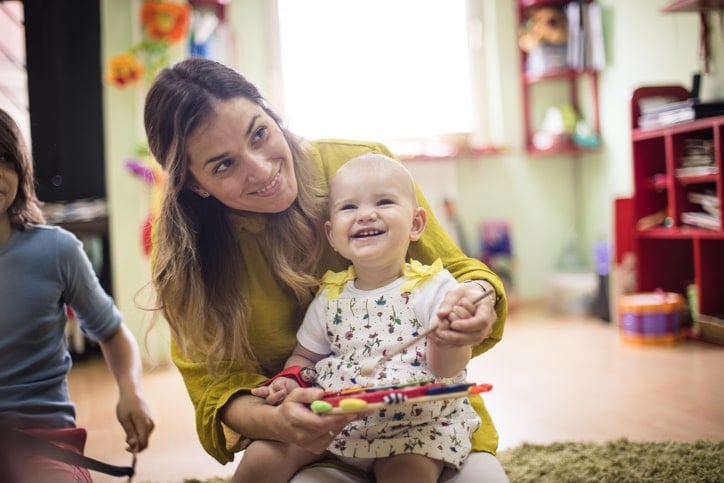Can musical training help babies learn language?

If you think about it, music and spoken language have a lot in common. They both use tones and rhythms. And studies indicate that there is some overlap in the ways that the brain processes music and speech. If you are good at listening to music, you tend to be good at listening to language (Ong et al 2017), and this may apply to babies as well as adults.

For example, in one study, researchers presented newborn babies with musical sounds — a recording of an adult singing a series of syllables in a continuous, melodic stream. While the babies listened, the researchers also measured the infants’ brain activity, and there was a pattern: Newborns who showed enhanced neural processing during the singing went on to develop more advanced vocabularies when they were toddlers (Francois et al 2017).
So can we promote language development by exposing babies to music? There is circumstantial evidence in favor of the idea. In a study tracking 36 babies over time, infants who heard a lot of parental singing at 6 months tended to experience better language outcomes at 14 months (Franco et al 2022). And there is experimental evidence, too.
In one case, 9-month-old babies participated a series of 15-minute sessions where they listened to music in triple meter (the waltz). During these sessions, parents helped the babies move in sync with the beat, by bouncing them, tapping toes, or encouraging the infants to play with percussive musical toys (like a rattle).
The babies experienced about 3 sessions per week, and at the end of 4 weeks, their brains were scanned while they listened to samples of both speech and music. Compared with babies in a control group, the musically-trained infants showed an enhanced ability to spot deviations in the tempo of both spoken language and music (Zhao and Kuhl 2016).
A more recent experiment took a similar approach, but started with somewhat younger babies, and broadened rhythm training to include music of a variety of meters. In fun, playful sessions, babies listened to music while bouncing on fitness balls with their parents. They also beat out the rhythms they heard on drums. They danced to the music, and froze when it stopped. They shook rattles, keeping the beat, and matching the intensity of the sound.
After 6 weeks of this training, babies showed a shift in brain processing. But — just as intriguing — these infants also went on to develop stronger language skills when they were 12 months old (Dondena et al 2021).
As the researchers note, we need more such studies to confirm the effect. But given all the other benefits of music training — the way it inspires us, stimulates us, and provides us with joy — it seems we have everything to gain from exposing our babies to music, melodies, and rhythms. And it’s fun to consider: Our babies begin listening to music even before they are born. As I explain elsewhere, they can hear muffled sounds through the womb, and there’s evidence that newborns can recognize songs they encountered in the last few weeks before birth.
So I think it’s safe to say that babies are ready to experience the joy of music with us, and there is good reason to think that babies benefit from age-appropriate musical training, if by “training” we mean something like “social play that helps babies attend to rhythm and changes in pitch.”
Who knows, we might even lay the groundwork for a child’s future interest in playing a musical instrument, which (among other things) can shape the development of brain networks that process music. When musically-trained people listen to music, these brain networks are especially active (Olszewska et al 2021).
More Parenting Science articles about babies learning language
Does music training enhance a child’s intelligence? That’s much less clear, but you can read about the evidence here. And for more information about language development in babies, check out these articles:
References: Can musical training help babies learn language?
Dondena C, Riva V, Molteni M, Musacchia G, Cantiani C. 2021. Impact of Early Rhythmic Training on Language Acquisition and Electrophysiological Functioning Underlying Auditory Processing: Feasibility and Preliminary Findings in Typically Developing Infants. Brain Sci. 11(11):1546.
Franco F, Suttora C, Spinelli M, Kozar I, Fasolo M. 2022. Singing to infants matters: Early singing interactions affect musical preferences and facilitate vocabulary building. J Child Lang. 2022 May;49(3):552-577.
François C, Teixidó M, Takerkart S, Agut T, Bosch L, Rodriguez-Fornells A. 2017. Enhanced Neonatal Brain Responses To Sung Streams Predict Vocabulary Outcomes By Age 18 Months. Sci Rep. 7(1):12451
Olszewska AM, Gaca M, Herman AM, Jednoróg K, Marchewka A. 2021. How Musical Training Shapes the Adult Brain: Predispositions and Neuroplasticity. Front Neurosci. 2021 Mar 10;15:630829.
Ong JH, Burnham D, Stevens CJ, Escudero P. 2016. Naïve learners show cross-domain transfer after distributional learning: the case of lexical and musical pitch. Front. Psychol. 7:1189.
Zhao TC and Kuhl PK. 2016. Musical intervention enhances infants’ neural processing of temporal structure in music and speech. Proc Natl Acad Sci U S A. 113(19):5212-7.
Image of baby on mother’s lap by Liderina / istock
Content last modified 6/2022















